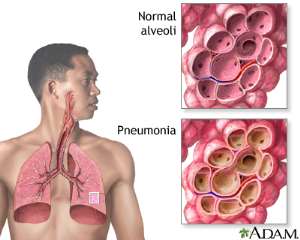
Pneumonia is referred to as the infection that inflames the air sacs (alveoli) in either one or both the lungs. Fluid or pus may get filled in the alveoli, leading to difficulty in breathing and can also cause cough with phlegm or pus, fever, etc. Pneumonia can be mild and even life-threatening. Infants and young children, people older than age 65, and people with health problems or weakened immune systems are most prone to serious pneumonia.
Symptoms of pneumonia include:
- Coughing that can generate phlegm (mucus)
- Fever
- Chills or sweating
- Shortness of breath usually during normal activities or at times even while resting
- Chest pain that worsens while breathing or coughing
- Fatigue or tiredness
- Loss of appetite
Some symptoms that vary according to the age are:
- Children under the age of 5 years may experience fast breathing or wheezing.
- Infants generally do not show very noticeable symptoms, but may vomit sometimes, lack of energy, or have trouble drinking or eating.
- Older people also usually have milder symptoms. They are likely to show confusion, changes in mental health or a lower than normal body temperature.
If consistent difficulty in breathing is observed accompanied by chest pain or persistent fever usually of 102 F (39 C) or higher, or persistent cough, especially with pus, it is advised to get yourself examined said Dr. Suruchi, Consultant – Pediatrics and Pediatric Endocrinology, Columbia Asia Hospital Whitefield.
It’s more important for people in these high-risk groups to visit a doctor:
- Elderly people over 65 years of age
- Children below the age of 2 years with the above-mentioned signs and symptoms
- People with an underlying health condition or those with a weak immune system
- People undergoing chemotherapy or taking medication that suppresses the immune system
- For some older adults and people with chronic lung problems or heart failure
There are many types of infectious agents that can cause pneumonia.
Some of the risk factors for pneumonia include:
- A variety of organisms, including bacteria, virus, and fungi can be held responsible.
- The germs that lead to pneumonia are contagious as well which means they can spread from person to person.
- Airborne droplets from a sneeze or cough if inhaled can also spread viral or bacterial pneumonia.
- Coming in contact with surfaces or objects that are contaminated with pneumonia-causing bacteria or viruses can also cause infection.
- Fungi from soil or bird droppings can also lead to pneumonia, especially in people with weakened immune systems.
Even with treatment, some people with pneumonia, especially those in high-risk groups may experience complications, including:
For prevention of pneumonia:
Pneumonia in kids
During childhood, pneumonia becomes a rather common condition. The causes of childhood pneumonia can however vary. Pneumonia can be dangerous especially in young children.
For children under 5 years of age, pneumonia due to respiratory viruses, Streptococcus pneumonia, and Haemophilus influenza. For children between the ages of 5 and 13, pneumonia due to Mycoplasma pneumonia is frequently observed in children.
If the following signs are noticed in the child, do consult the pediatrician:
Dr. Suruchi, Consultant – Paediatrics and Paediatric Endocrinology, Columbia Asia Hospital Whitefield
- Being hospitalized often leaves the patient exposed to the risk of pneumonia, especially if the patient is on a breathing-related machine like a ventilator.
- If a person already has asthma, chronic obstructive pulmonary disease (COPD) or heart disease.
- If a person is a regular smoker, his/her body’s natural defenses against the bacteria and viruses that because pneumonia are damaged.
- People with HIV/AIDS, who’ve had an organ transplant, or who receive chemotherapy or long-term steroids are at risk.
- Bacteria that enter the bloodstream (bacteremia) from the lungs can spread the infection to other organs, and tend to cause organ failure.
- If the pneumonia is severe or the person has chronic underlying lung diseases, one can have trouble breathing in the enough amount of oxygen.
- Pneumonia can also cause fluid to build up in the thin space between layers of tissue that line the lungs and chest cavity (pleura).
- Get proper vaccination that is available to prevent certain types of pneumonia and the flu. Take these in proper consultation with your doctor.
- Ensure good hygiene.
- Avoid smoking.
- Strengthen the immune system.
- Take enough sleep, exercise regularly and eat a healthy diet.
- Trouble breathing
- Lack of energy
- Changes in appetite
- High- grade fever








